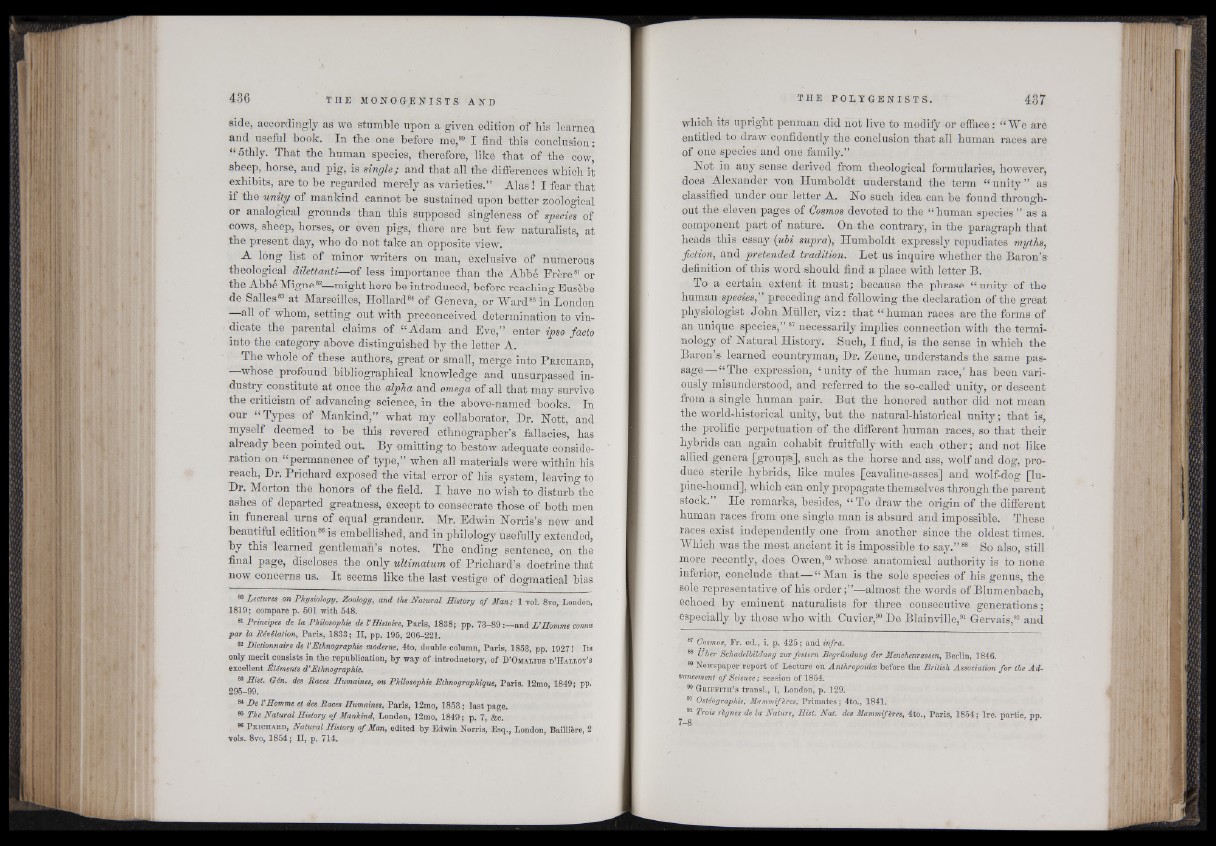
side, accordingly as we stumble upon a given edition of bis learned
and useful book. In tbe one before me,80 I find tbis conclusion :
“ 5thly. That the human species, therefore, like that of the cow,
sheep, horse, and pig, is single ; and that all the differences which it
exhibits, are to be regarded merely as varieties.” Alas ! I fear that
if the unity of mankind cannot be sustained upon better zoological
or analogical grounds than this supposed singleness of species of
cows, sheep, horses, or even pigs, there are but few naturalists, at
the present day, who do not take an opposite view.
A long list of minor writers on man, exclusive of numerous
theological dilettanti—of less importance than the Abbé Frère81 or
the Abbé Migne82—might here be introduced, before reaching Eusèbe
de Salles83 at Marseilles, Hollard84 of Geneva, or Ward85 in London
all of whom, setting out with preconceived determination to vindicate
the parental claims of “Adam and Eve,” enter ipso facto
into the category above distinguished by the letter A.
The whole of these authors, great or small, merge into P richard,
whose profound bibliographical knowledge- and unsurpassed in-
dustry constitute at once the alpha and omega of all that may survive
the criticism of advancing science, in the above-named books. In
our “ Types of Mankind,” what my collaborator, Dr. Hott, and
myself deemed to be this revered ethnographer’s fallacies, has
already been pointed out. By omitting to bestow adequate consideration
on ‘permanence of type,” when all materials were within his
reach, Dr. Prichard exposed the vital error of his system, leaving to
Dr. Morton the honors of the field. I have no wish to disturb the
ashes of departed greatness, except to consecrate those of both men
in funereal urns of equal grandeur. Mr. Edwin Horris’s new and
beautiful edition86 is embellished, and in philology usefully extended,
by this learned gentleman’s notes. The ending sentence, on the
final page, discloses the only ultimatum of Prichard’s doctrine that
now concerns us. It seems like the last vestige of dogmatical bias
80 Lectures on Physiology, Zoology, and the Natural History of Man; 1 vol. 8vo, London,
1819; compare p. 501 with 548.
« Principes de la Philosophie de l’Histoire, Paris, 1838; pp. 73-89 and L ’Homme connu
par la Révélation, Paris, 1833; II, pp. 195, 206-221.
82 Dictionnaire de l’Ethnographie moderne, 4to, double column, Paris, 1853, pp. 1927! Its
only merit consists in the republication, by way of introductory, of D ’Om a i iu s d ’H a l io y ’s
excellent Éléments d’Ethnographie,
88 Hist. Gén. des Races Humaines, ou Philosophie Ethnographique, Paris 12mo 1849- pp.
295-99.
84 De V Homme et des Races Humaines, Paris, 12mo, 1853 ; last page.
88 The Natural History of Mankind, London, 12mo, 1849; p. 7, &c.
88 P r ic h a r d , Natural History of Man, edited b y Edwin Norris, Esq., London, Baillière, 2
vols. 8vo, 1854; H, p. 714.
which its upright penman did not live to modify or efface: “We are
entitled to draw confidently the conclusion that all human races are
of one species and one family.”
Hot in any sense derived from theological formularies, however,
does Alexander von Humboldt understand the term “ unity” as
classified under our letter A. Ho such idea can be found throughout
the eleven pages of Cosmos devoted to the “ human species ” as a
component part of nature. On the contrary, in the paragraph that
heads this essay (ubi supra), Humboldt expressly repudiates myths,
fiction, and pretended tradition. Let us inquire whether the Baron’s
definition of this word should find a place with letter B.
To a certain extent it must; because the phrase “ unity of the
human species,” preceding and following the declaration of the great
physiologist John Müller, viz: that “ human races are the forms of
an unique species,” 87 necessarily implies connection with the terminology
of Saturai History. Such, I find, is the sense in which the
Baron’s learned countryman, Dr. Zeune, understands the same passage—
“The expression, Junity of the human race,’ has been variously
misunderstood, and referred to the so-called unity, or descent
from a single human pair. But the honored author did not mean
the world-historical unity, but the natural-historical unity ; that is,
the prolific perpetuation of the different human races, so that their
hybrids can again cohabit fruitfully with each ,other; and not like
allied genera [groups], such as the horse and ass, wolf and dog, produce
sterile hybrids, like mules [eavaline-asses] and wolf-dog [lupin
e-hound], which can only propagate themselves through the parent
stock.” He remarks, besides, “ To draw the origin of the different
human races from one single man is absurd and impossible. These
races exist independently one from another since the oldest times.
Which was the most ancient it is impossible to say.”88 Bo also, still
more recently, does Gwen,89 whose anatomical authority is to none
inferior, conclude that—“ Man is the sole species- of his genus, the
sole representative of his order;”—almost the words of Blumenbach,
echoed by eminent naturalists for three consecutive generations ;
especially by those who with Cuvier,90 De Blainville,91 Gervais,92 and
87 Oosmos, Fr. ed., i. p. 425; and infra.
88 Uber Schadelbildung zur festem Begründung der Menchenrassen, Berlin, 1846.
80 Newspaper report of Lecture on Anthropoidoe before the British Association for the Advancement
of Science ; session of 1854.
90 G r i f f i t h ’s transi., I, London, p. 129.
91 Ostéographie, Mammifères, Primates ; 4to., 1841.
92 Trois règnes de la Nature, Hist. Nat. des Mammifères, 4to., Paris, 1854; Ire. partie, pp.